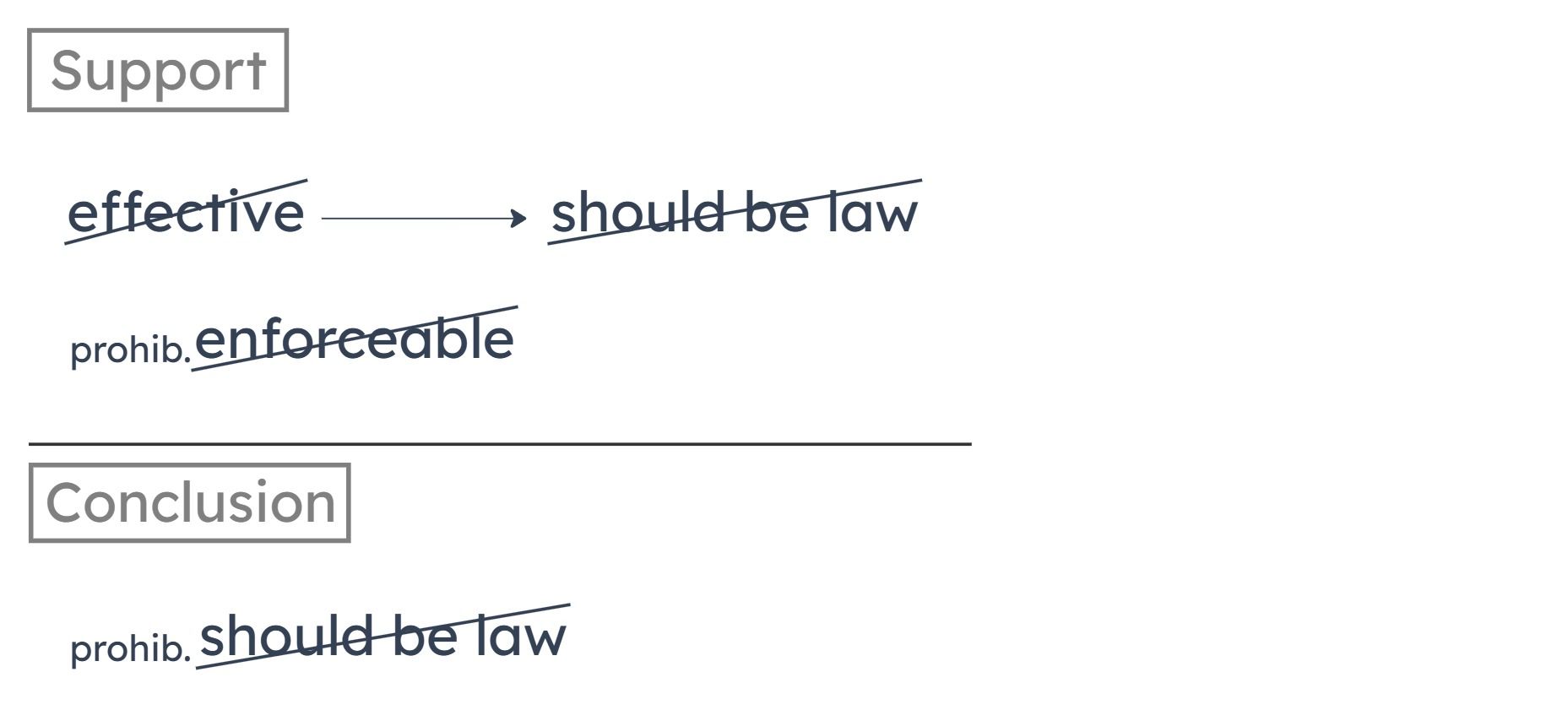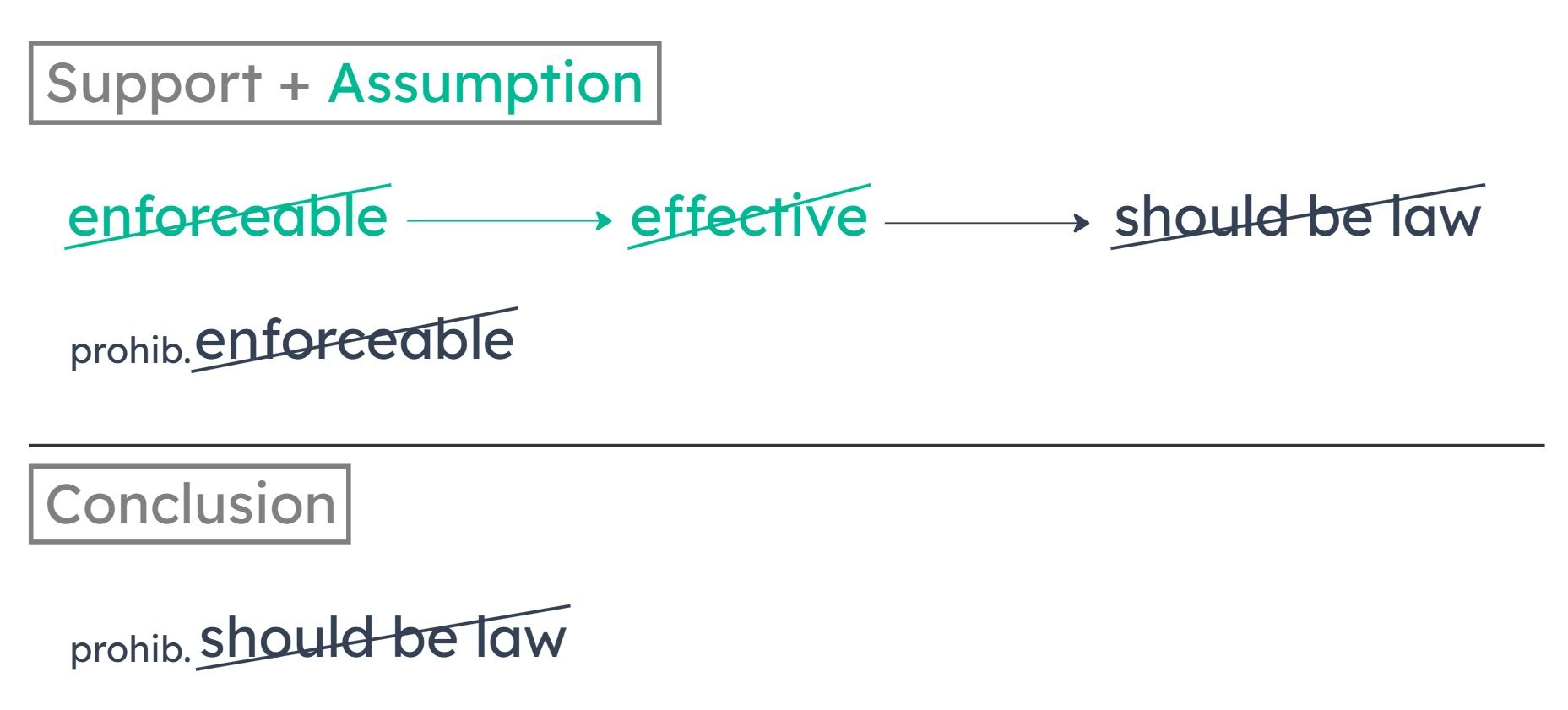Summary
The conclusion is that there shouldn’t be a legal prohibition against gambling. This is based on the following:
Gambling laws can’t be enforced.
If a law is not effective, it should not be a law.

Gambling laws can’t be enforced.
If a law is not effective, it should not be a law.

Missing Connection
The second premise (if a law is not effective, it should not be a law) gives us a way to prove that something should be a law. So if we can learn that gambling laws aren’t effective, we can prove that they shouldn’t be laws. The first premise establishes that gambling laws can’t be enforced. There’s a missing link between “can’t be enforced” and “not effective.” We should go to the answer looking for “If a law can’t be enforced, then it’s not effective.” Or, the contrapositive: “If a law is effective, it has to be enforceable.”
A
No effective law is unenforceable.
This establishes that if a law is effective, it must NOT be UNenforceable. Take away the double negative and this means, if a law is effective it must be enforceable. This establishes that since gambling laws aren’t enforceable, they cannot be effective. 

B
All enforceable laws are effective.
This means that if a law is enforceable, it’s effective. This reverses what we’re looking for. (B) doesn’t prove that if a law isn’t enforceable, it can’t be effective. In other words, (B) still allows for gambling laws to be effective, even though they’re not enforceable.
C
No legal prohibitions against gambling are enforceable.
A premise already establishes that gambling prohibitions are not enforceable. (C) doesn’t establish that the gambling prohibitions are not EFFECTIVE. There’s a difference between “not enforceable” and “not effective.”
D
Most citizens must agree with a law for the law to be effective.
The premises don’t give us enough to establish that most citizens don’t agree with gambling laws; so (D) doesn’t establish that gambling laws aren’t effective. We know that most citizens recognize that they’re not enforceable, but this doesn’t imply that they don’t agree with the laws.
E
Most citizens must agree with a law for the law to be enforceable.
The premises already establish that gambling laws are not enforceable. (E) doesn’t establish that the laws are not EFFECTIVE. There’s a difference between “not enforceable” and “not effective.”
Summarize Argument
The author concludes that there is no reason not to grant most 17-year-olds the privileges of adulthood. This is based on the fact that society is obligated to grant these privileges to all of its members who are mature enough to accept the corresponding responsibilities. And, science has shown that physiological development — which the author calls the “maturing process” — is completed in most people by the age of 17.
Identify and Describe Flaw
The author shifts between two meanings of “mature.” Although society is obligated to grant the privileges of adulthood to people who are “mature” enough to accept corresponding responsibilities, this use of “mature” refers to one’s mental and moral development, not physiological development. But the author then relies on the physiological maturity of most 17-year-olds. This is a different sense of the concept “mature.”
A
assumes what it is trying to prove
The author does not use circular reasoning. None of the premises assumes that there’s no reason not to grant most 17-year-olds the privileges of adulthood.
B
too hastily reaches a general conclusion on the basis of a few examples
The author does not cite to a few examples to support his conclusion. The author instead cites to a principle regarding what society is obligated to do, as well as what science has established. Neither of these premises involve individual examples.
C
equivocates with respect to a central concept
The author equivocates with respect to the central concept of maturity. The principle regarding society’s obligations uses “maturity” in its mental or moral sense. But the author then relies on evidence regarding “maturity” in its physical development sense.
D
too readily accepts a claim by appeal to inappropriate authority
The author does not rely on authority to support his conclusion. He doesn’t ask us to believe the conclusion because an authority has said it or otherwise supports it.
E
ignores the fact that some people are mature at age sixteen
The author never assumes that 16-year-olds are never mature. He acknowledges that the physical maturing process is complete by the time most people reach seventeen; this allows for people to become mature before 17.